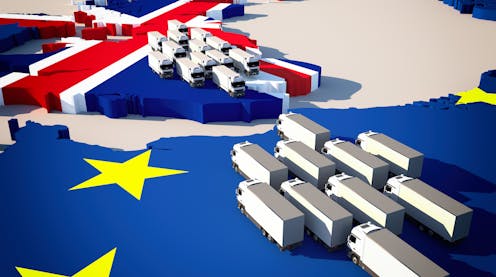The decision to ditch the UK's Department for International Trade is testament to the failure of Brexit
- Written by Tony Heron, Professor of International Political Economy, University of York

The move to merge[1] the UK government’s departments of trade and business has been likened by one journalist to rearranging the deckchairs[2] on a sinking ship. But it is in fact a significant moment in the country’s foreign and economic policy – and a tacit acknowledgement that attempts to seize Brexit “opportunities” through trade have been a failure.
For as a result of the changes, the Department for International Trade no longer exists. Set up less than a month after the 2016 referendum, it was created by former prime minister Theresa May as a way of demonstrating sovereignty through independence[3] from the EU.
Yet its first task was urgently securing the “rollover” of free trade deals that the UK had already enjoyed as an EU member. When Liz Truss took over the department in 2019, she proved herself to be a skilled political operator as she travelled the world doing exactly this.
Burnishing her pro-Brexit credentials (despite having voted to remain in the EU), she presented these rollover agreements as clear benefits of Brexit. This sleight of hand was aped by other ministers, including the recent suggestion that the government has managed to secure £800 billion in “new free trade deals” with over 70 countries[4].
That claim led to a rare reprimand from the head of the UK’s statistics watchdog, which said the £800 billion figure was “misleading[5]”. The important point is that in the vast majority of cases, the free trade agreements were not new deals, but continuations of existing agreements. They did nothing more than maintain the pre-Brexit status quo.
The sole exceptions to this were deals with Australia and New Zealand, two small, economically open but geographically distant economies with historical connections to the UK. But even here the balance did not necessarily tilt in the UK’s favour.
The free trade agreement with Australia[6] in particular, gave Australian agriculture unprecedented levels of access[7] to the UK market. It has since been described[8] as “not actually a very good deal for the UK” by the very politician who was in charge of UK farming at the time the agreement was negotiated.
Meanwhile, the prospect of concluding a trade deal with the US (presented as the biggest prize of all) is, our research suggests[9], all but dead. There was already little progress under the Trump administration in 2020, in the face of differences over issues like food standards. And the Biden administration has little interest in new trade agreements at all, let alone one with a government it sees as acting irresponsibly over the Northern Ireland protocol[10].
Elsewhere, the UK’s plans to join the Comprehensive and Progressive Trans-Pacific Partnership[11] free-trade agreement with the likes of Japan, Canada and Chile, as well as further trade negotiations with India, will not be completed anytime soon.
Most of the problems plaguing UK trade policy since Brexit arguably stem from the absence of a coherent strategy[12] built around policy. There needs to be greater thought given to how trade and industrial policy can actually be used to improve export performance, rather than treating the signing of new trade deals as the ultimate goal. The stark reality is that, since Brexit, the UK’s level of exports to both EU and non-EU countries has been poor and falling short[13] of all of its major competitors.
A more sensible approach to trade would begin by mitigating the damage already done by Brexit. A simple first step would be to realign UK and EU safety standards for agrifood and plant products, reducing considerably the bureaucracy that has rendered the Northern Ireland protocol almost inoperable[15].
There also has to be a recognition that globally there has been a shift away[16] from negotiating big trade agreements of the kind the UK government has been so fond of. The EU and the US, for instance, are putting more emphasis in their trade strategies on making use of existing agreements to achieve particular objectives around workers’ rights and protecting the environment.
In the UK, the task for the next government will be to act similarly, see the bigger picture, and abandon the practice of trade policy[17] as an exercise in post-Brexit optics. It needs to work out how trade policy can instead be used to make a meaningful contribution to some of the most urgent social and environmental challenges facing the UK, like net zero, greener industries and an altogether more balanced economy.
References
- ^ move to merge (www.politico.eu)
- ^ rearranging the deckchairs (www.theguardian.com)
- ^ sovereignty through independence (politicalquarterly.org.uk)
- ^ with over 70 countries (twitter.com)
- ^ misleading (www.theguardian.com)
- ^ with Australia (theconversation.com)
- ^ unprecedented levels of access (www.lowyinstitute.org)
- ^ been described (www.theguardian.com)
- ^ our research suggests (onlinelibrary.wiley.com)
- ^ Northern Ireland protocol (theconversation.com)
- ^ Comprehensive and Progressive Trans-Pacific Partnership (www.instituteforgovernment.org.uk)
- ^ absence of a coherent strategy (www.tandfonline.com)
- ^ falling short (ukandeu.ac.uk)
- ^ Shutterstock/Ceri Breeze (www.shutterstock.com)
- ^ almost inoperable (ukandeu.ac.uk)
- ^ shift away (www.tandfonline.com)
- ^ practice of trade policy (politicalquarterly.org.uk)







